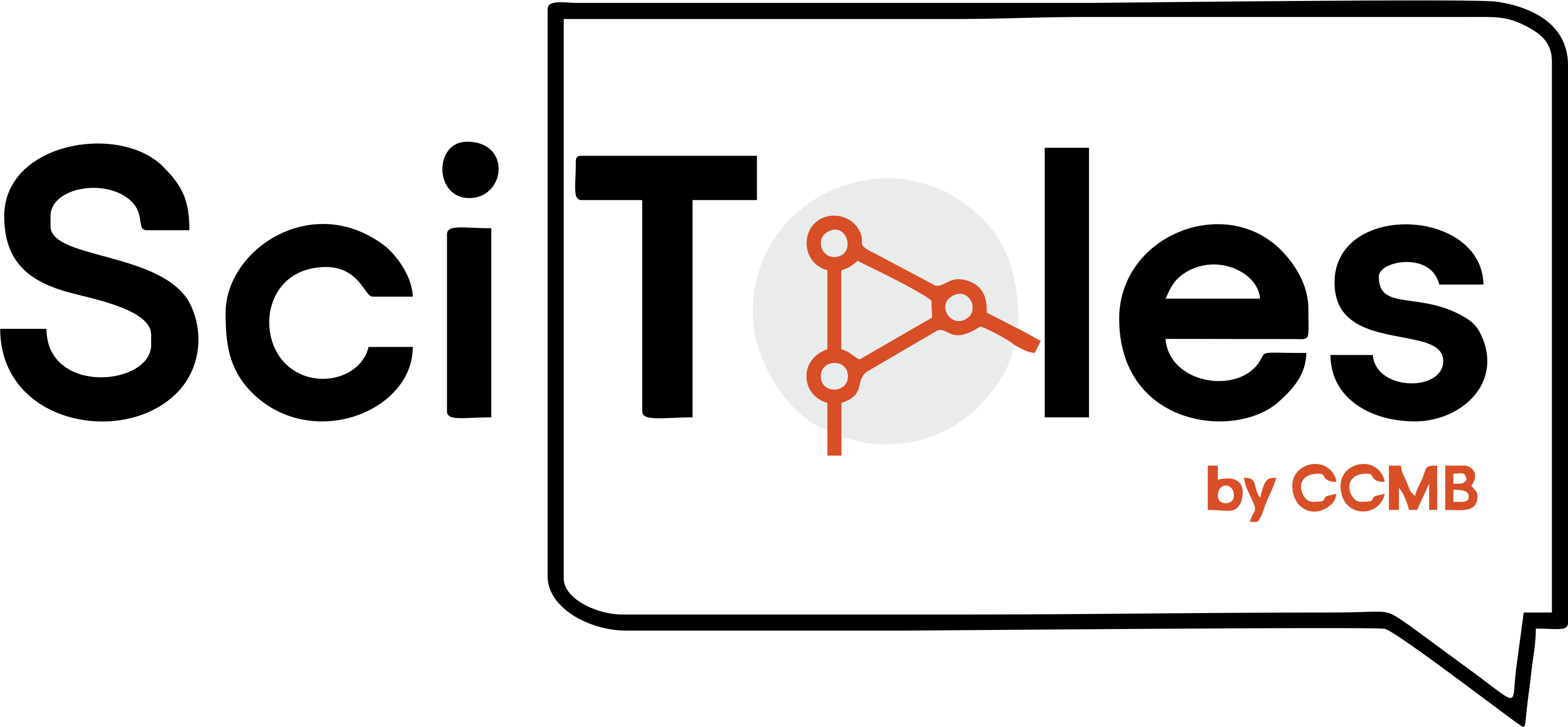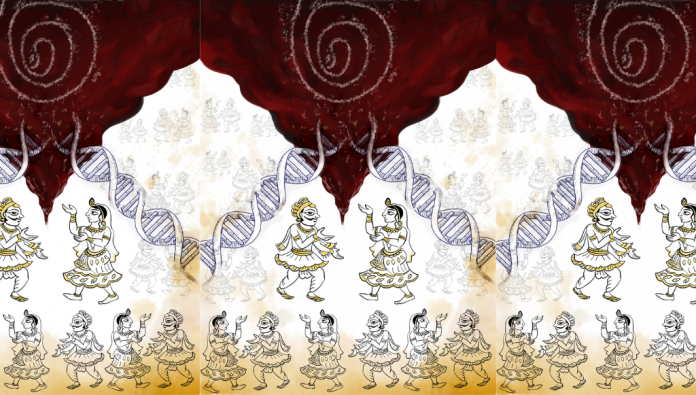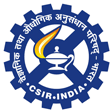Rishta do DNA ka (The bond of two DNA). PC: Conceptualized by Ashish Bihani, executed by Sudipta Mondal
It was a typical Sunday. My mother and I were engaged in our usual conversations, discussing family matters to office gossip, and making plans for the upcoming week. My mother had recently heard of genetic tests to predict diseases, and thought of bringing that up. Sooner than we knew, our conversation had taken an unexpected educational turn.
I am the first biologist in a family of chefs, teachers, and businessmen. I am currently pursuing a PhD in human genetics and am often turned to for advice by my family members for anything biology or medicine. My mother is a teacher, and questions everything. She has a medical condition known as ankylosing spondylitis, which is an autoimmune disorder. In this condition, the immune system of the body starts attacking its own cells present in the spine. Despite being in severe chronic pain, she is a warrior and never gives up, she works, goes for yoga and loves to dance in the disco. But she also prays every day that her children should never get this disease.
Ankylosing spondylitis has been associated with a mutation in the HLA-B27 gene, meaning that the disease has genetic origins. My mother knows that if the gene has already been passed to us, prayers may not be able to fix that! So she wanted to know if the genetic tests can be useful to us.
Direct-to-consumer genetic testing (DTC GT) has gained a lot of popularity over the past few years. The idea that we can order a genetic test for ourselves online, without even having a doctor’s prescription is quite exciting. Quickly, we were deep into the details of what such genetic tests promise and can deliver. Mom asked if knowing about the genetic information will help us prevent the disease. The question was simple; however, I realised the answer was rather complex.
Our genetic data is like a manual to our body and just like the ones for IKEA furniture, it might not always be easy to interpret. Some genetic mutations alter protein structures, and hence there is no scope for preventing it. Sickle Cell disease, for instance, is a genetic disorder that occurs due to a specific mutation in the haemoglobin gene. This mutation causes the red blood cells’ haemoglobin to clump together, which changes the cells’ shape from round to sickle-like. This mutation is certain to cause the disease in someone having both diseased copies of the gene and cannot be prevented, as of today, despite having the knowledge that the individual has the mutation.
Some genetic mutations can cause a protein to be dysfunctional, produced less, or ineffective in processing a substance in the body. Knowing about such a condition can help an individual receive appropriate treatment or take preventive measures. For example, a genetic test can indicate whether an individual is at risk of developing lactose intolerance. Lactose intolerance occurs when the body cannot digest lactose, a sugar found in most dairy products, due to insufficient production of an enzyme called lactase. Although most infants are born with the ability to produce lactase, its production decreases with age. People who produce too little lactase may experience bloating and other stomach issues after consuming lactose-containing products. The solution to this problem is simple: avoid dairy products that contain lactose.
On the other hand, several illnesses, such as ankylosing spondylitis, type 2 diabetes and certain cancers, are categorized as complex diseases. This means that they can arise due to multiple genes and environmental factors. Therefore, even if a person possesses the genes for the disease, they may not necessarily develop it if they take preventive measures. In such cases, it may be beneficial to determine your genetic predisposition to these diseases.
Having said this, it’s important to clarify that the genetic risk for complex diseases, as the name suggests, are not easy to find out. The risk of getting a condition like diabetes has been associated with several hundreds of genes. An individual’s risk of diabetes can be assessed by summing up the effect of both risk and protective mutations, this metric is referred to as a polygenic risk score. To find these genes, enormous studies involving participation of several lakhs of people are required; most of these have been conducted in European populations. The genetic risk scores derived from European populations are capable of predicting diseases in different ancestries only to some extent. Their accuracy reduces depending on how genetically diverse the population is from the Europeans.
In a study of more than 1000 Asian genomes, researchers found that 23% of the protein-affecting genetic variants they identified were previously unreported in existing genomic databases with majority European and Non-Asian representation. Hence, a genetic score that may predict the risk of a disease in Europeans may not necessarily be accurate in Indians. To date, information on other populations such as Asians and Africans remain scarce, and hence, results provided from DTC GT reports must be taken with caution, if you are an Indian. It is crucial to inquire with the DTC GT company you choose about the origin of their data, and if their conclusions are drawn from the population you identify with. By doing so, you can gain a better understanding of the significance of the information provided in their report.
Phew! My mom sighed and stopped me mid-way indicating that she got the gist and instantly popped the next question. “So”, she said, “I have little control over some genetic disorders and may not be able stop the disease from occurring in myself. However, could I have prevented passing the diseased genes to my children? Also, now since the damage might already have been done, can I know what genetic risks I have passed on to my children?”
I continued to explain – If you have taken a genetic test and discovered that you are genetically predisposed to a particular disease, it is possible to have your children tested to determine if they also carry the genetic risk. Some disorders, such as sickle cell disease and thalassemia, manifest when an individual acquires faulty genes from both parents. If you possess only one copy of the faulty gene, you will not develop the disease and may not be aware that you are a carrier. However, if your partner also carries the same faulty gene, there is a 1 in 4 chance that your child will inherit both copies, resulting in the disease. In such cases, it is advisable to determine if you and your partner carry the risk mutations before having children to prevent the possibility of having a child with a severe, sometimes lethal disorder. However, similar preventative testing before pregnancy for complex diseases that are caused by a combination of genetic and environmental factors is not yet feasible.
Curious about the experiences of others who had undergone genetic testing, she started pondering what they had gained from it. I took to the internet and discovered a variety of responses. Many individuals who have discovered that they are at an increased genetic risk of developing a particular disease have adopted preventive measures, such as lifestyle changes, to reduce their risk. Others become anxious when they learn that they have a high risk of developing a disorder like breast cancer. Some people are also dissatisfied with the language used in genetic testing reports, which often include terms like probabilities and relative risks, and struggle with interpreting the results they receive. Clearly, there is a still a lot to understand how these tests can become more useful and user-friendly.
Nevertheless, according to an article on the American Medical Association website, about 100 million people had been estimated to have taken a DTC genetic test in 2021. So, the popularity of these tests is definitely on a rise.
“How safe would it be to hand over the information of your genes to these companies, could they misuse it?,” my mom asked with some scepticism. Some digging into the policy documentation of various companies told me that each DTC GT company has its own privacy policy that clearly specifies and obtains consent regarding the data the client is willing to share. Hence if opting for such a service, it is critical to thoroughly read and understand the policy before enrolling in the service. Also, it’s important to take note that this field is still in its nascent stages and these companies may not be well regulated by medical agencies in India.
With some trepidation, I asked her, “Mom, now that you have a better understanding of these tests, do you think you would consider getting one?” In response, she delighted me by singing her all-time favourite song –
“Qué será, será
Whatever will be, will be
The future’s not ours to see
Qué será, será
What will be, will be”


